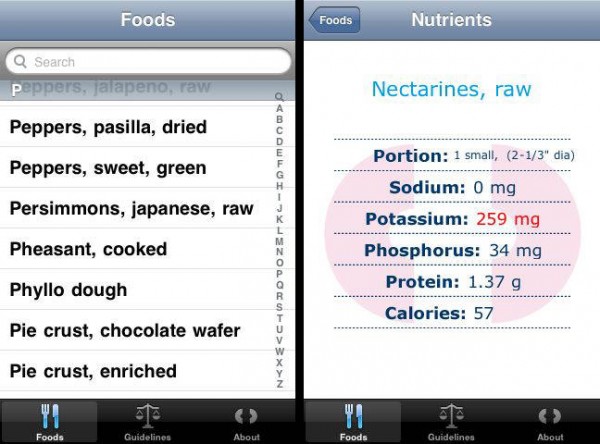
KidneyDiet functions as a reference to both nutrition and health, and as such is a very useful portable guide for patients who suffer from kidney disease. For anyone who suffers from renal failure in the end stage, or from kidney disease that’s chronic, diet plays an essential part in health maintenance. With KidneyDiet, you are given an exhaustive list of thousands of types of food, with valuable information about nutrition that is specifically directed at and tailored for kidney patients who are on a restricted diet. Caloric and sodium content are listed, as well as amounts of protein, phosphorus, and potassium. Any items of food that happen to contain a particularly high level of any of these are marked in red, identifying them as particularly poor choices of food.
It can be quite hard to monitor the necessarily restricted diets of kidney patients, particularly when you have no idea how much protein, phosphorus, or potassium are contained in any particular food. A lot of patients are advised to be wary of specific categories of food, but having the ability to make quick comparisons between foods while shopping for groceries or dining in a restaurant can be extremely helpful. KidneyDiet gives people suffering from kidney disease a very useful way to find and pick out the specific foods that are within the parameters of the guidelines for diet that they have been given.
KidneyDiet is very easy to use, and in common with a lot of apps based on databases of food, provide a list of foods sorted alphabetically as well as function for doing specific searches. The majority of foods are just listed by what type of food they are, while some are also listed under brand names, for example Stouffers or Kraft, and yet others are identified by the actual name of the product, such as SunChips, SpaghetiOs, and Pop Tarts. There are also many restaurants included in the database, such as Wendys, TGIFridays, and Applebees. It takes a bit of exploring to get the full concept of the organization of foods, but the database is, overall, pretty comprehensive.
The one drawback is that there isn’t any analysis of carbohydrate contents. Some kidney patients also suffer from diabetes, which makes the monitoring of carbs very necessary. Aside from that unfortunate lack, KidneyDiet is a very helpful and comprehensive portable reference for anyone coping with the diet limitations imposed by kidney disease.










Comments